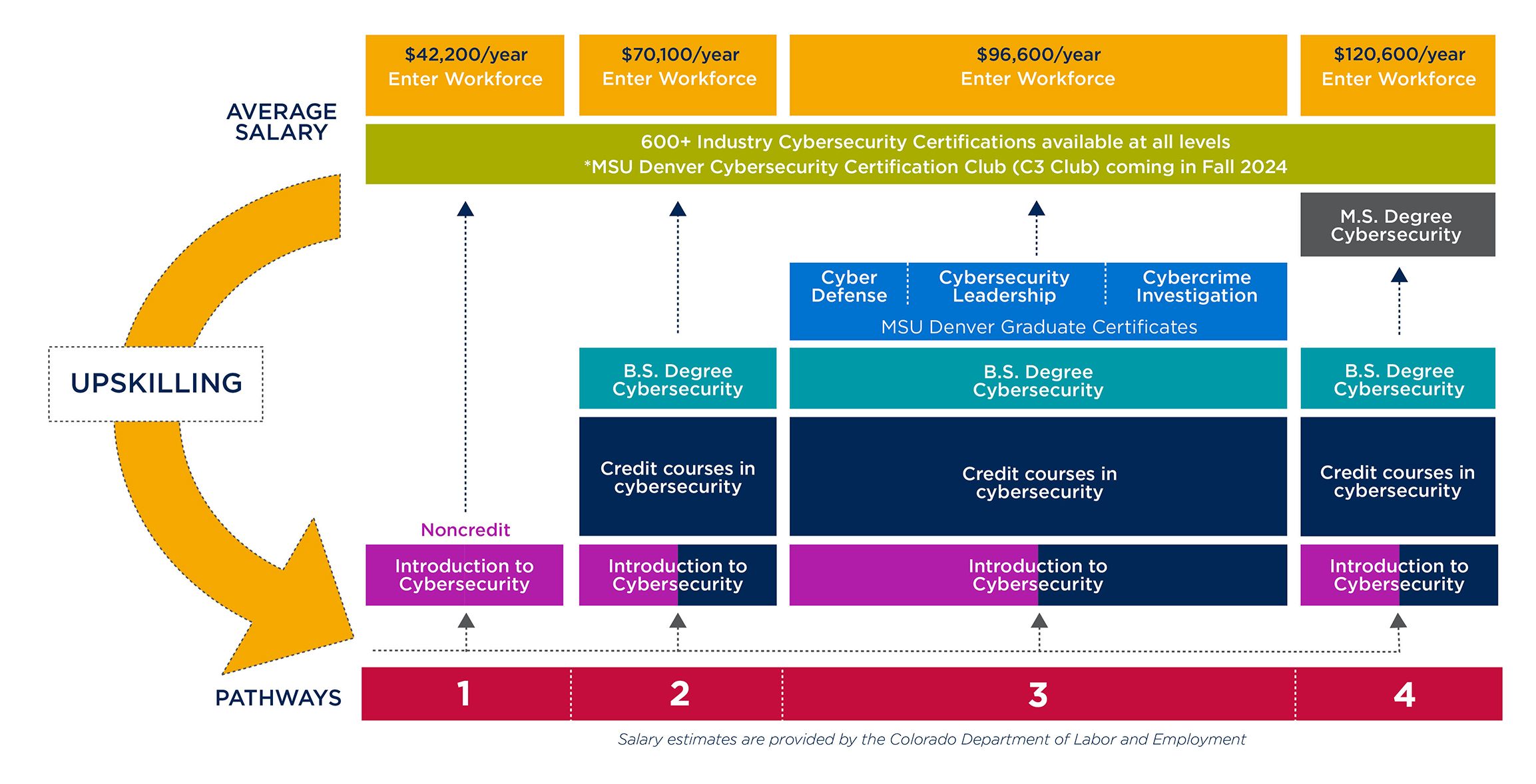Request Information
Ready to find out what MSU Denver can do for you? We’ve got you covered.
Cybersecurity is an exciting, complex, and diverse field that is critical to all industries. As our lives become more dependent on internet-based tools and services, the demand has grown for cybersecurity experts. The security field in Colorado continues to grow and is expected to have over 13,000 job openings in 2025.
The Introduction to Cybersecurity course explores a wide range of fields within Cybersecurity, such as infrastructure, network and internet security, intrusion detection and prevention, information systems strategy and planning, security risk analysis and risk management, information assurance, and cybersecurity infrastructure.
This cybersecurity intro course will help you identify your areas of interest within cybersecurity and can stack into a degree at MSU Denver. Or, use the skills learned to find a job in cybersecurity in network security, risk management, or security operations.
Course can be completed in 4-8 weeks and is self-paced online.
Receive a personal advising session with an industry leader.
Gain a competitive edge.

After taking the course, the learner can immediately enter the workforce, or continue on academic career to increase earning potential. There are many rewarding and in-demand careers in cybersecurity. From completing our online introduction courses, to pursuing a masters in cybersecurity, learn more about these pathways below and shape your future with MSU Denver.
Pathway 1: Enter the workforce quickly. Complete the Introduction to Cybersecurity course and immediately enter the workforce with job titles like cybersecurity technician, cybercrime analyst, incident analyst, IT auditor, junior penetration tester, and systems administrator. The (ISC)2 Cybersecurity Certification aligns well with this pathway.
Pathway 2: Continue your academic career to earn a degree in Cybersecurity, which will allow you to increase your earning potential. The Introduction to Cybersecurity class can count toward the degree’s required courses. Job titles include information security analyst, security analyst, customer security specialist, IT auditor, and security engineer. The CompTIA Security+ or (ISC)2 SSCP Certifications align well with this pathway.
Pathway 3: Continue your academic career beyond a bachelor’s degree to earn one of MSU Denver’s Cybersecurity certificates in cyber defense, cybersecurity leadership, and cybercrime investigation. The CompTIA CYSA+ or CompTIA Pentest+ Certifications align well with this pathway.
Pathway 4: Enhance your earning power with MSU Denver’s Master of Science in Cybersecurity. The Introduction to Cybersecurity class can count toward the degree’s required courses. With a Master’s in cybersecurity, potential job titles include cybersecurity case manager, senior cybersecurity engineer, senior network security operations engineer, application security architect, and director of IT security. The (ISC)2 CISSP or CompTIA CASP+ Certifications align well with this pathway.
Note: In addition to the ones noted, there are 600+ industry specific certifications available in Cybersecurity. Start on your path today!
The Introduction to Cybersecurity course provides a broad overview of cybersecurity, including how computers and networks are attacked, how the attackers benefit, and how to mitigate attack. The terminology, approaches, and underlying technologies used in cybersecurity are also covered. Social engineering, cryptography, and application security are introduced.
This cybersecurity intro course will help you identify your personal areas of interest in cybersecurity to continue learning through various learning pathways. Or, consider using your new skills to find a job in cybersecurity, such as network security, risk management, and security operations. This course also helps those already working in cybersecurity to gain more knowledge and understanding about the future of the industry.
The course is $450, with a $35 transaction fee per payment. There are no books to purchase.
Once you successfully complete the cybersecurity introduction course, you can immediately enter the workforce with newly learned skills. You will receive a digital badge embedded with the competencies learned. You can include this badge on your resume, LinkedIn page, portfolio, or share it with an employer. Students will also receive a certificate of completion.
Students can also convert the course to three credits and continue to an MSU Denver certificate or degree. See FAQs for more information.
Learning objectives:
Competencies to be gained:
Jesse Schulman is an MSU Denver faculty member with a firm belief that cybersecurity can be fun. He has a Bachelor’s degree in Theatre from Trinity University and a Master’s degree in Cybersecurity from the University of North Carolina Charlotte. He is currently working toward his Ph.D. at Northcentral University.
Having worked as both a security engineer and a security researcher, Jesse helps students learn and engage with computer security in an enjoyable and easy-to-understand way. He believes that the ultimate purpose of education is to help students discover their passion and find what career they genuinely enjoy.
Phone: 303-615-1234
Office Location:
Jordan Student Success Building
3rd Floor – #330
Auraria Campus
Mailing Address:
Metropolitan State University of Denver
Innovative and Lifelong Learning
P.O. Box 173362
Campus Box 6
Denver, CO 80217-3362